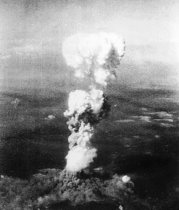© 2005 All Rights Reserved. Do not distribute or repurpose this work without written permission from the copyright holder(s).
Printed from https://danginteresting.com/a-hairsbreadth-from-utter-destruction/

September 26th, 1983 doesn’t stick out in the annals of history as a day to remember. It wasn’t the day of a great discovery. It wasn’t the beginning of a new era in science or art. For many years, the only thing of note that happened on this day was that the Australians beat the Americans in the Americas Cup. In reality, it became the day that the world was literally saved by the enemy.
1983 found the world in the middle of the Cold War. The Communist Soviets and the Capitalist Americans looked over the oceans at each other with propagandically driven distrust, fear, and hate. It was the beginning of the age of spy satellites, nuclear rockets and itchy trigger fingers. The world was still reeling from the aftermath of Korean Air Flight 007.
On Sept 1st of that year, the Soviets had shot down a straying Korean Air flight, killing all 269 passengers aboard, including a US Senator. The flight had strayed into an area usually targeted by US spy planes but hadn’t turned back as the spy flight usually did. The Soviets, thinking of this as a provocation, scrambled their jets and blew it out of the sky 55 km out to sea. The world was shocked. The US called it a “massacre”, an “act of barbarism”, and a “crime against humanity”. Political ties were strained to breaking and the Russian state airline Aeroflot was driven out of the United States. In a scene that could have been taken from “Crimson Tide”, “War Games”, or “Dr. StrangeLove”, unfolded one of the most frightening moments in history.

Deep in a secret bunker near Moscow, Colonel Stanislav Petrov was in command of a listening post designed to monitor the nuclear launch detecting satellites in the event that the United States attacked Russia. It was all part of the Mutually Assured Destruction doctorine which didn’t really care, however futile, if anyone survived a nuclear attack, but was more concerned with making sure your missles were launched back in retaliation before you were blown into nothingness.
Suddenly, a large red button with the word “START” lit up. According to the early warning system, the US had just launched a nuclear rocket. Stanislav related that it was a moment of “collasal shock”, everyone jumped up from their posts and looked at him. Thirty levels of confirmation said it was an attack, but he decided it had to be a glitch. There there was another alarm, and another and another and another. According to his computer system 5 nuclear warheads were on their way to destroy his homeland.
Colonel Petrov had 2-3 minutes to make a decision. If he waited too long, it would be too late to attempt a counter strike. If he pressed the button it would allow former head of the KGB turned Soviet leader Yuri Andropov to launch a counter offensive that would kill millions. In a moment of intuition, inspiration, just dumb luck, he decided to go with what he knew. He said, “In two or three minutes you aren’t going to fully analyze anything. Intuition is all that is left. I had two arguments. First, a nuclear attack doesn’t start from one base, but from all of them. Second, the computer by definition is an idiot. What wouldn’t it recognize as a launch…”
So, going against everything he was trained to do, even against the protocols he himself had written, Colonel Stanislav Ephriamavich Petrov did NOT push the button.
In the investigation that followed, it turned out that the new satellite system was not very complete. Instead of geosychronous orbits, the satellites were in elliptical orbits and very often were in positions where there was only one in the sky over a certain area. The “rocket launches’ they detected were sun rays bouncing off of high altitude clouds.
The investigative committee neither condemned nor rewarded Petrov. He says that if they had rewarded him, they would have had to punish someone else. Especially those who designed the satellite system. Instead, Petrov slipped into the woodworks and retired after a few months. Some say he was driven out. He says he got tired of military life.
Either way, he is living out his life in a small city outside of Moscow on a meager pension. Invitations from admirers go unheeded. He has stacks of cards from visiting journalists, only 3 of which are Russian. The West sees him as a hero. He just says, “I just did my job. At the right place. At the right time.”
© 2005 All Rights Reserved. Do not distribute or repurpose this work without written permission from the copyright holder(s).
Printed from https://danginteresting.com/a-hairsbreadth-from-utter-destruction/
Since you enjoyed our work enough to print it out, and read it clear to the end, would you consider donating a few dollars at https://danginteresting.com/donate ?